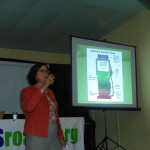Posted by Michael Haran on May 21, 2014
The official kickoff of the 4th District supervisorial race may have been on April 28th at Cardinal Newman High but the real start was on April 23rd at the Windsor Grange Hall when the five candidates met to say what they would do about Sonoma County’s poor roads if they were elected to replace outgoing Mike McGuire who is running for the state senate.

Mike McGuire
Sponsored by SOS Roads, a local road improvement advocacy group, the topic drew a group of about forty people. Bill Finkelstein and Craig Harrison of SOSR were moderators and Mike McGuire was the master of ceremonies. Having McGuire at the meeting was tailor made for the candidates to take pot shots at what the county has done on road maintenance and other things.
Mike opened the discussion by PowerPoint highlighting what the county has done toward road since he became supervisor in 2010. He said, “This is a legacy problem,” as past supervisors withheld money for road repairs. The county has spent over $8 million from the general fund in the past two years to repair 40 miles of priority roads. He showed slides of new roads on Westside, W. Dry Creek; Eastside; Lytton Springs; and Geyserville Roads. He said a top priority is to put sidewalks in Geyserville. McGuire continued that the county is working on finding more money for more road repair. He then turned the program over to Director of Transportation and Public Works Susan Klassen.
Susan showed slides of how the spending on roads had decreased over the past thirty years. One slide really stood out. It was a vertical bar graph that showed how much money each California County received from gas tax. Because state road maintained allotments are based on population, Orange County, with a population of over three million and 312 miles of paved roads compared to Sonoma County’s population of just under five hundred thousand and 1,370 miles of paved roads, gets about six times what Sonoma gets(Orange County must have really nice roads).

Susan Klassen
When asked what they would do to improve county road conditions the candidates took turns. Pete Foppiano wants to see a change in the way gas tax is distributed stating that the current formula favors counties with high a number of registered vehicles and small road networks. James Gore targeted unfunded pension liability in wanting to reform the county budget but didn’t support new taxes. “I won’t kick the can down the road, because it will probably fall into a pothole,” he said.
Keith Rhinehart said that the idea of spending millions of dollars on cycling routes that affect 1 percent of the commuting public is unconscionable and that he would eliminate bike path construction in favor of road repairs and tax cyclists. Finkelstein reminded Rhinehart that cyclists also drive cars and so pay the same taxes as everyone else. Rhinehart said that he will work as hard as anyone to fix this pension crisis.
Deb Fudge said she is wants to hear the county’s long-term roads plan, which McGuire said would be released within 60 days, and is interested in the $1 billion plus, 20-year project to rehabilitating the entire road network. When she said that it could be paid for by a sales or property tax increase one women in the audience commented, “No way.” Fudge quickly added, “Only with voter approval.” I don’t think Fudge is getting that women’s vote.
Ken Churchill, a longtime advocate of overhauling pensions, said that pensions are costing us money that is not fixing our roads and new taxes are not going to do it. When McGuire said that the county’s pension liability is now about 80% funded, Churchill challenged that figure saying that it’s closer to 60%. McGuire then said that the new actuarial figures backed him up and Churchill admitted that he hadn’t seen the new figures. McGuire went on to counsel the pension hawks saying that even with futures savings it’s not a dollar for dollar deal.

SOS Roads Forum
As the debate/conversation continued to intensify McGuire, as only he would do, decided that everyone needed chocolate so he passed around a basket. Finkelstein spotted Jim Wood, Healdsburg mayor and candidate for the 2nd Assembly district, and ask if he anything to add to the road conversation. Wood said that he didn’t as he was there on a fact finding mission.
Craig Harrison held up a sign that said “Tired of Potholes?” go to SOSRoad.org.” He said anyone who wants a sign should go to the organization’s website which is an excellent resource for information regarding Sonoma County roads. He continued that a statewide pension fix would help improve all nine Bay Area roads. To that end they have filed a “Friend of the Court” brief in the City of Stockton federal bankruptcy case arguing that retirement benefits owed to city workers should not emerge unscathed from a municipal bankruptcy.
All and all it was a fun get-together. The crowd was engaged and even a local climate denier, who kept blurting out “junk science” (about what wasn’t clear), didn’t dull the interchange. Local politics at its best.
Read More
Posted by Michael Haran on Apr 20, 2013
Close to Home
Teachers Need the Tools
By Michael Haran
4/19/2013
Published in the Press Democrat 4/20/2013
After reading Andy Brennan and Simone Harris’ Close to Home article (A teacher’s perspective on improved learning PD 4/4/13) and Bill Gates article (Here’s a fairer way to evaluate teachers PD 4/5/13) on teacher evaluation neither article addressed the new curriculums that are now being developed by K-12 textbook and eBook publishers and the evolution of K-12 teaching methods.
Under Obama’s Race to the Top states are required to meet three main educational criteria: adoption of rigorous academic achievement standards; a program to focus on turning around low performing schools; and the most contentious provision, an accountability system that would involve using test scores to evaluate teachers and principals.
In 2010, California became one of 45 states to adopt the new Common Core State Standards (CCSS) Initiative to meet these criteria and the transition is now under way. Assessments aligned with the standards are also being developed and are expected to be in place for the 2014-15 school year, replacing the STAR tests. The new standards and skill requirements have been developed with the goal of creating consistency across the country.
The California Legislature in March 2011 suspended the adoption of instructional materials until the 2014–15 school year. This was due partially to budget cuts but also to allow time for publishers to adapt instruction materials to the Common Core State Standards (CCSS).
Just like a good race car mechanic a teacher needs sound methodology and precision tools to be successful. Anyone who studies K-12 education knows that the industry has long needed a makeover. Everything evolves and we are now watching an evolution in teaching structure. Many school districts are experimenting with, if not outright adopting, the progressive teaching/learning model called “Flipping the Classroom.”
In flip teaching, the student first studies the topic by himself, typically using video lessons created by the instructor or those provided by an Open Education Recourse (OER), such as the Khan Academy. In the classroom, the pupil then tries to apply the knowledge by solving problems and doing practical applications. The role of the classroom teacher is then to tutor the student when they become stuck, rather than to impart the initial lesson. This allows time inside the class to be used for additional activities, including use of “differentiated instruction” which is more student specific and “project-based learning” which is the practical application.
In another progressive teaching/learning model North Carolina State University College of Education has developed program which they call the FIZZ concept. With this program students video themselves reciting a lesson. The object is to allow students to revisit the video to evaluate and analyze not only what they have learned but also what their peers have learned. The objective is to give the student “ownership” of the lesson which they call the highest level of learning.
Along with the evolution of teaching methodology the next generation of K-12 instruction materials needs to be written to align to these and other progressive teaching models. The publishers now have an opportunity to incorporate modern learning technology with the four predominate student learning styles which are: Linguistic (“word smart” they learn by writing and reading); Logical-mathematical (“number/reasoning smart) Spatial (“picture smart” they learn from images); Bodily-Kinesthetic (“body smart” they need to be moving to learn). I think “Bodily-Kinesthetic learners are many times misdiagnosed with having ADD.
If you want to increase test scores give teachers curriculum that develops the coveted goals of critical thinking, collaboration and communication in all students. You can’t win the race without the right tools.
Michael Haran is research director for the Institute of Progressive Education and Learning.
Read More
Posted by Michael Haran on Aug 11, 2011
By Michael Haran
Published Healdsburg Tribune 8/11/2011
I ran into Mike McGuire the other day at the First Annual Healdsburg Water Carnival. He asked how I was doing and we chatted about county politics for a few minutes until another constituent came up and wanted to thank him for something. Knowing that his time is limited at these public affairs I excused myself and walked on.
I first met Mike and his wife Erika a few years ago at the Kiwanis pancake breakfast at the Villa when they sat down across from my wife and me. I recognized him from the city council articles in the Tribune. He introduced himself and Erika and then wanted to know about us. I felt his interest sincere.
Sometime in early 2010 I ran into him at Amoruso Printing. I had been working on a project to sell wine in China and when I told him a little about it he wanted to know all about it. So we scheduled a coffee and met at the Goat. Having taken a couple of poly-sci courses at Sonoma State in the early 70’s I was eager to give him my two cents on how he could win his upcoming election.
I had one issue to talk to him about which I call “pothole politics.” He listened intently as I explained the theory of the lowest common denominator. If he knew about it he didn’t let on and let me finish talking. Judging from his margin of victory I think he knew very well about this theory.

In the fall of 2010, I attended Mike’s debate with Debra Fudge at the Raven Theater. As Mike announced the endorsement of several business and civic groups Debra criticized him for seeking those endorsements. Mike responded that Debra had also pursued those endorsements. She continued by asking him how he intended to handle any conflict of interest in dealing with such diverse groups. He paused for a moment, turned toward Debra and, almost under his breath said to her, “Don’t worry, it’ll be alright.”
This amazed me. It was as if Mike thought that Debra was sincerely worried about this and his initial reaction was to reassure a worried constituent. I think this goes back to his days on the Healdsburg School Board where he developed his people skills. As Pat Wyman said in an article on Mike soon after he was elected, “If you know McGuire at all, you know how much he loves one-on-one meetings and how accessible he is.” It should be mandatory for every politician to spend some time on a local school board.
His election to the Board of Supervisors comes at a time of extreme austerity. He has to deal with SMART extensions, education, the increased demand for senior care, jobs, pension reform, education, clean air, housing and the homeless and all on a shrinking revenue base. He is new to this and his challenges are many but Mike McGuire is a unique individual and with his work ethic I really do believe that “it will be alright.” And it’s nice to know that I’m not the only one that feels this way.
Read More







